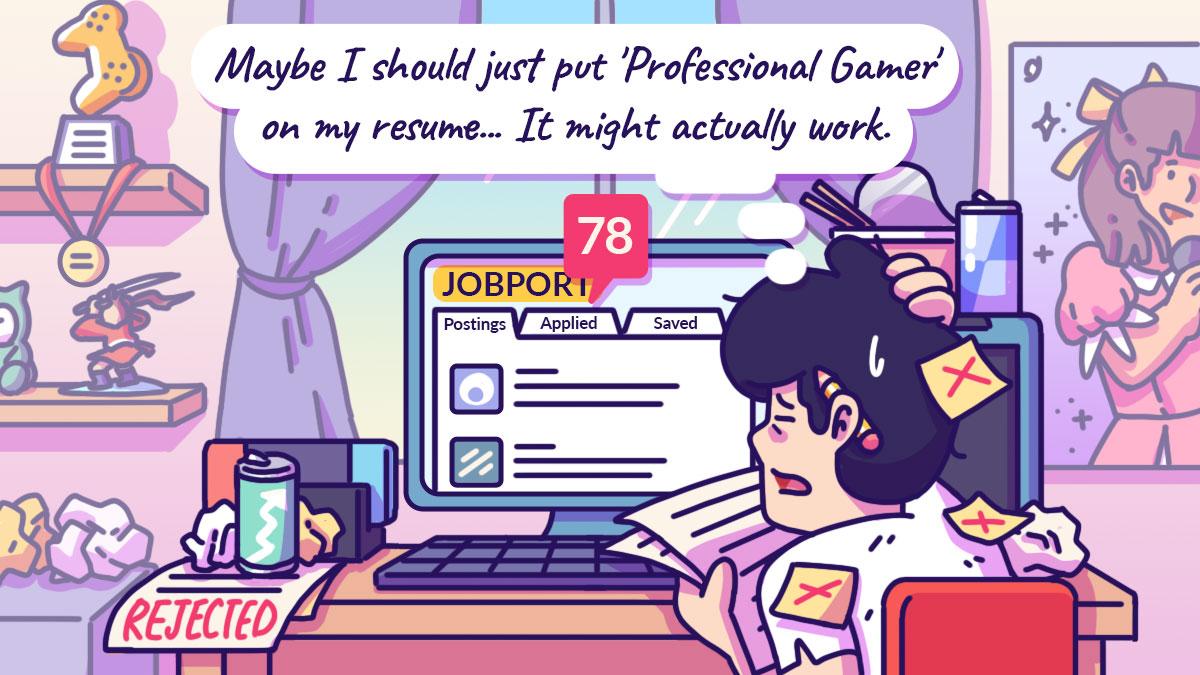You’ve climbed your way up the corporate ladder, but there are still moments when you feel like you don’t deserve to “be here”, or to have the job or position you currently have.

It doesn’t matter how long you’ve been working or how many years of experience you have on your belt. Sometimes, it feels almost like certainty: you’re a fraud.This feeling – feeling like a fraud at work – is a product of imposter syndrome. The term was first coined in the 1970s by psychologists Suzanne Imes and Pauline Rose Clance to describe a phenomenon where “high achievers … are unable to internalise or accept their success”.
Here are some other thoughts that might’ve plagued you, thanks to imposter syndrome:
“Anyone could do what I’ve done.”
“How have people not seen through me yet?”
“I only did well because I had a lot of help from everyone else — it’s not really my achievement.”
“That was just luck!”Sounds perfectionistic, don’t you think? It’s because a big part of imposter syndrome has roots in perfectionism and anxiety. According to the International Journal of Behavioural Science, about
70% of people experience this phenomenon.
Locally, according to a 2020
global survey conducted by Asana, 74% of Singaporean workers said that they experienced some form of imposter syndrome at work.
Imposter syndrome isn’t an official diagnosis of a mental disorder. But just because it isn’t classified as a mental disorder doesn’t mean that this psychological pattern doesn’t impact one’s career progression.
How can imposter syndrome lead to career sabotage?
A study from the US National Library of Medicine conducted in 2016 found that imposter syndrome — or the imposter phenomenon — often led to “decreased career planning, career striving, and the motivation to lead”. Participants who reported high scores in imposter feelings were less likely to engage in career planning.
According to the study, imposter syndrome roots a person to the spot, because they fail to recognise their fullest potential and competencies. They might even settle for the same job, the same position, for longer than is necessary. In other words, those with imposter syndrome tend to stay in their comfort zones.
According to the 2016 study, two of the three major preconditions of imposter syndrome are a person’s low self-esteem and fear of failure. Even if you’re capable of carrying more responsibilities or taking on a leadership role, an outsized fear of failure could stop you from gunning for those big opportunities at work.
In the workplace, your imposter syndrome could deny you the chance to prove yourself worthy of the next promotion or the next salary increment. And if you can’t prove yourself or demonstrate that you have reached certain achievements, you’ll have nothing to show for your progress at your next career appraisal.
And if you don’t bring your achievements to attention in due course, then you’re
definitely not moving up the career ladder.
So, what can you do to counteract the imposter inside you?
Combat imposter syndrome
Recognition from an external source can be a great help if you want to counter these feelings of not being good enough, and snuffing out the voice of the imposter inside you.

Ask colleagues and superiors how you’re doing
There’s nothing quite like receiving affirmation from your team members or direct superiors. These are the people who have proper, accurate insights into how you’re doing as a colleague and employee, especially when it comes to the projects you’ve been handling.
So all you have to do is ask — establish positive feedback loops and get input from those who know what you’re like at work, and have them remind you of your achievements.
These external voices are effective at combating the imposter’s voice inside you, and quash those feelings of inadequacy.
Take things one step further and schedule regular feedback sessions if you’re bent on improving yourself at work.
But just remember: good feedback is always constructive, while bad feedback (which isn’t the same as negative feedback) only leaves you feeling torn down and even worse than before.Try asking these questions during your feedback sessions to make it productive and helpful:
- What do you think are some areas of development for me?
- In what ways am I performing well at work?
- How do you think I can better manage my current workload?
- If I wanted to work towards a promotion or raise, what should I continue doing, and what other responsibilities could I take on?
While it’s important to gain external validation from your colleagues and superiors, especially with the use of these questions, it’s also equally vital that you’re able to provide internal validation for yourself too. And one way you can do this is to…
Keep track of your progress and write it down
Taking note of professional milestones and achievements regularly, outside of your feedback sessions, is another way to reaffirm your place in the company and fend off the imposter’s voice in you.
You could write a weekly log where you reflect on the past week, and take the chance to plan ahead for the coming weeks as well. Here’s an example:
Week 4
Past week achievements:
- Streamlined the workflow with the team last week for an ongoing project
- Solved a pressing problem with X colleague and managed to meet the deadline
- Onboarded two new clients for upcoming collaborations
Focus for next week:
- Concluding the ongoing project’s current phase before moving on to the next
- Leading brainstorming sessions with the team for collaboration ideas
By the end of the year (or even just a couple of months), you’ll find that you have plenty to talk about in terms of what you have achieved at work. So when the time comes for a performance appraisal, you’ll know exactly what to bring up to justify asking for a raise or even a promotion.
Work out a timeline for your (eventual) progression
Talk to your supervisor and ask about a possible promotion, or work on a timeline or plan that will take you to an eventual promotion, whether it’s in three months or six months.
Breaking things down into actionable next steps will help you to progress in the right direction, while also making sure that you don’t give the imposter inside you a chance to cast any doubt on your performance.
The idea is to make a concrete and realistic plan so you can stay grounded to reality, instead of simply dwelling on your self-doubt and the voice of the imposter in you.
Don’t let your imposter win
Imposter syndrome happens to the best of us, even to those who have achieved so much both professionally and otherwise. People like Serena Williams and Tina Fey struggle with feelings of being a fraud, too — but anyone can see that they have achieved a lot in their respective fields.
So instead of wallowing in your self-doubt, use feedback sessions and closely track your achievements and progress at work to fend off the imposter inside you. Hopefully for long enough — and
consistently enough that you can move up the ladder, increase your earning power, and eventually come to accept the greatness of your own potential.
 It doesn’t matter how long you’ve been working or how many years of experience you have on your belt. Sometimes, it feels almost like certainty: you’re a fraud.This feeling – feeling like a fraud at work – is a product of imposter syndrome. The term was first coined in the 1970s by psychologists Suzanne Imes and Pauline Rose Clance to describe a phenomenon where “high achievers … are unable to internalise or accept their success”.
Here are some other thoughts that might’ve plagued you, thanks to imposter syndrome:
“Anyone could do what I’ve done.”
“How have people not seen through me yet?”
“I only did well because I had a lot of help from everyone else — it’s not really my achievement.”
“That was just luck!”Sounds perfectionistic, don’t you think? It’s because a big part of imposter syndrome has roots in perfectionism and anxiety. According to the International Journal of Behavioural Science, about 70% of people experience this phenomenon.
Locally, according to a 2020 global survey conducted by Asana, 74% of Singaporean workers said that they experienced some form of imposter syndrome at work.
Imposter syndrome isn’t an official diagnosis of a mental disorder. But just because it isn’t classified as a mental disorder doesn’t mean that this psychological pattern doesn’t impact one’s career progression.
It doesn’t matter how long you’ve been working or how many years of experience you have on your belt. Sometimes, it feels almost like certainty: you’re a fraud.This feeling – feeling like a fraud at work – is a product of imposter syndrome. The term was first coined in the 1970s by psychologists Suzanne Imes and Pauline Rose Clance to describe a phenomenon where “high achievers … are unable to internalise or accept their success”.
Here are some other thoughts that might’ve plagued you, thanks to imposter syndrome:
“Anyone could do what I’ve done.”
“How have people not seen through me yet?”
“I only did well because I had a lot of help from everyone else — it’s not really my achievement.”
“That was just luck!”Sounds perfectionistic, don’t you think? It’s because a big part of imposter syndrome has roots in perfectionism and anxiety. According to the International Journal of Behavioural Science, about 70% of people experience this phenomenon.
Locally, according to a 2020 global survey conducted by Asana, 74% of Singaporean workers said that they experienced some form of imposter syndrome at work.
Imposter syndrome isn’t an official diagnosis of a mental disorder. But just because it isn’t classified as a mental disorder doesn’t mean that this psychological pattern doesn’t impact one’s career progression.












